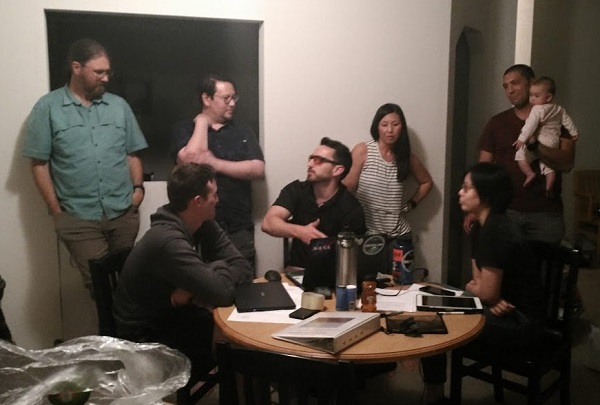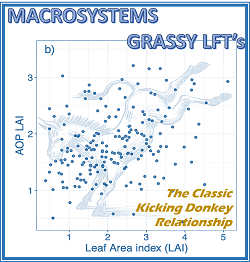Grassland Macroecology
Grass-dominated ecosystems (grasslands and savannas) are tremendously diverse and play an important role in regional and global carbon, water, and energy cycling. However, grass species are underrepresented in plant trait databases and subsequently omitted in macroecology analyses and syntheses.

Looking for our grass species at the beautiful shortgrass steppe in eastern CO. From l to r: Ryan the Younger, Che-Ling Ho, Dan Griffith, Brent Helliker, Ryan the Elder, Chris Still, Steph Pau, Dan Okamoto, and Baby Mari
In this collaborative project, we are collecting data to fill critical gaps in grass species traits and macroecology, and enhance understanding of grass-dominated ecosystems at regional and continental scales. We are developing a novel evolution-based framework to enhance our understanding of grass lineages, grass biogeography, and grass function in herbaceous ecosystems. This work will link phylogenetic data directly into global modeling efforts, thus increasing connectivity across ecological fields. The proposed evolutionary framework, coupled with extensive datasets collected at multiple scales, will be used to link mechanistic plant functional traits across broad eco-climatic gradients to answer fundamental questions about the evolution of trait coordination, how traits scale to landscape-level ecosystem function, and the filtering of regional species pools to form local communities.

This is how science gets done! An evening strategy session with Chris, Dan, Ryan the Younger, Ryan the Elder, Steph, Che Ling, and Dan O.

To date, we have collected our trait data from 3 grasslands: Konza Prairie in 2020, the Central Plains Experimental Grassland (shortgrass steppe) in eastern CO and the Woodworth Prairie in North Dakota (part of the Chase Lake USFWS). CPER and Woodworth were visited in June 2021.
Our project logo (right) illustrates the lack of fit between measured leaf area index values and NEON AOP inferred LAI values from the Konza Prairie. This data and manuscript are in press at Ecology (Pau et al. in press).
Project supported by NSF-MSB:
Project PI's:
Dr. Chris Still (Oregon State University),
Dr. Brent Helliker (University of Pennsylvania),
Dr. Stephanie Pau (Florida State University),
Dr. Daniel Griffith (NASA Ames Research Center),
Dr. Bill Riley (Lawrence Berkeley National Labs)
Dr. Jesse Nippert (Kansas State University)
Project Post-docs:
Dr. Rongting Xu (Oregon State University)
Project Graduate Students:
Ryan "The Elder" Slapikas (Florida State University),
Ryan "The Younger" Donnelly (Kansas State University),
Adam Abudullahi (University of Pennsylvania)

Left: Chris collecting fluorescence data at the North Dakota site. Right: Brent and Chris making a pinky swear.